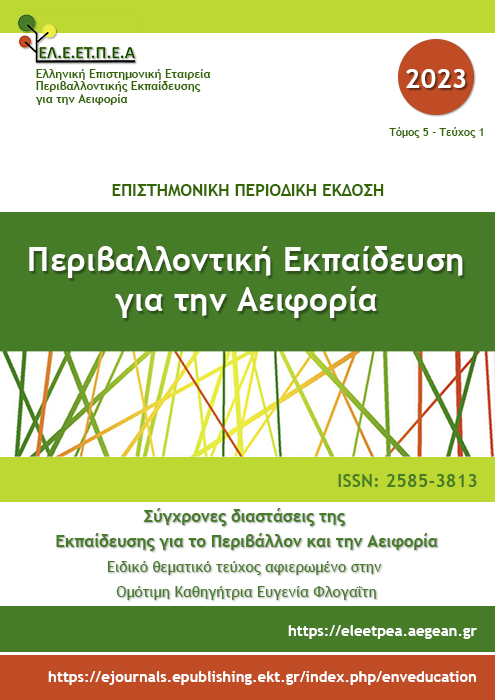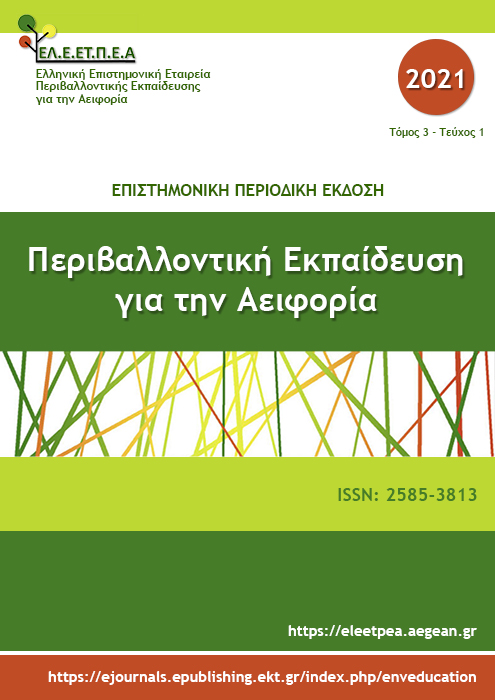Ολιστική Σχολική Προσέγγιση: Μια ολοκληρωμένη παιδαγωγική θεώρηση για την Εκπαίδευση για την Αειφόρο Ανάπτυξη
Resumen
Η Ολιστική Σχολική Προσέγγιση (ΟΣΠ) αποτελεί μια ολοκληρωμένη εκπαιδευτική πρόταση σε σχέση με τον αναπροσανατολισμό των εκπαιδευτικών συστημάτων σε μοντέλα αειφορίας. Προϋποθέτει συνολικές αλλαγές στη δομή και λειτουργία του σχολείου και συνεπάγεται ριζική αναθεώρηση της μαθησιακής/παιδαγωγικής διαδικασίας και των περιεχομένων μάθησης, στοιχείων που συνιστούν καθοριστικούς παράγοντες για την προώθηση θεσμικών, κοινωνικών και πολιτισμικών αλλαγών. Ταυτόχρονα συμβάλλει στην καθιέρωση της μετασχηματιστικής μάθησης ως θεμελιώδους έννοιας για το πώς ως άτομα και ως οργανωμένα σύνολα, επανεξετάζουμε τη συμπεριφορά μας, επανατοποθετούμαστε στην κοινωνία και αντιλαμβανόμαστε τις δυνατότητες μας για αλλαγή στη βάση των αρχών της αειφορίας. Bασικό ερώτημα παραμένει το πώς μπορεί να επαναπροσδιορισθεί συνολικά το όραμα για την εκπαίδευση, έτσι ώστε να καταστεί εφικτή η ΟΣΠ που θα καταστήσει το σχολείο, ως οργανικό τμήμα της κοινωνίας, μέτοχο στον αειφόρο μετασχηματισμό της. Η παρούσα εργασία εξετάζει θεωρητικά την έννοια και το περιεχόμενο της ΟΣΠ σε συνάρτηση με την Εκπαίδευση για την Αειφόρο Ανάπτυξη (ΕΑΑ) και τη μετασχηματιστική μάθηση ως ζητούμενο για την ΕΑΑ, αλλά και δομικό στοιχείο της ΟΣΠ. Αναλύονται οι ιδιότητες που καθιστούν την ΟΣΠ μια ολοκληρωμένη προσέγγιση, και εντοπίζονται οι προκλήσεις, ως σημαντικοί ανασχετικοί παράγοντες στην προσπάθεια που καταβάλλεται για να καταστούν τα σχολεία κοινότητες μάθησης για την αειφορία.
Article Details
- Cómo citar
-
Ζαχαρίου Α., & Κάτζη Χ. (2023). Ολιστική Σχολική Προσέγγιση: Μια ολοκληρωμένη παιδαγωγική θεώρηση για την Εκπαίδευση για την Αειφόρο Ανάπτυξη. Περιβαλλοντική Εκπαίδευση για την Αειφορία, 5(1), 163–176. https://doi.org/10.12681/ees.35778
- Sección
- Articles

Esta obra está bajo una licencia internacional Creative Commons Atribución-NoComercial-CompartirIgual 4.0.
Οι συγγραφείς διατηρούν τα πνευματικά δικαιώματα και παρέχουν στο περιοδικό το δικαίωμα της πρώτης δημοσίευσης μαζί με την αδειοδότηση της εργασίας με CC-BY-NC-SA, που επιτρέπει σε άλλους να μοιράζονται αυτή την εργασία με αναγνώριση του συγγραφικού δικαιώματος και την αρχική δημοσίευση σε αυτό το περιοδικό.



